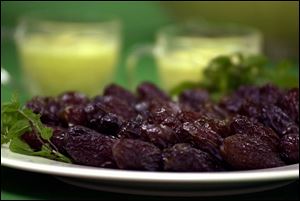
Iftar dinners held to break Ramadan fast
11/26/2001After a day of fasting for each day during Ramadan, Muslim families break the fast at dusk with water and dates followed by prayers and a meal. Not only are family dinners a tradition, so too are community dinners like the one held at the Islamic Center of Greater Toledo last Saturday night.
The dinner for the Muslim community of Toledo was the first of three Community Iftar Dinners planned, according to M. Razi Rafeeq, M.D., former president of the Islamic Center and chairman of the Iftar Dinner Committee. President Bush held an iftar dinner Nov. 19 in Washington, D.C., for ambassadors of Muslim countries.
Ramadan, which began Nov. 17, lasts 28 days. It commemorates when the Qur'an, Islam's holy book, was revealed to the Prophet Muhammad.
“Iftar is the fast-breaking meal,” said Dr. Rafeeq. For the Islamic Center event, “10 families buy food and cook it.”

Dates are eaten to break the fast, and Mango Lassi, background, is a favorite in Pakistan.
The first week, the meal included Lebanese, American, Indian, and Pakistani foods. “The families make food to the liking of everyone,” said Dr. Rafeeq. “American foods might include hot dogs, french fries, and spaghetti.” The range of foods in a community meal reflects the international heritage of those present.
The period of fasting lasts from dawn to just after sunset each day of Ramadan. It is compulsory for those who are mentally and physically fit, past the age of puberty, in a settled situation and not traveling, and are sure that fasting is unlikely to cause real physical or mental injury, according to the Council on American-Islamic Relations in Washington.
The breaking of the daily fast occurs with a drink of water and dates. “It was the first thing the Prophet Muhammad ate so it is the tradition of the prophet,” said Dr. Rafeeq, an Indian-born physician. “In these different ethnic cultures, people eat whatever is available and popular.”
Following the breaking of the fast in the dining hall, the people go upstairs to the prayer hall and perform sunset prayers that last five to seven minutes. “This is one of the five daily prayers,” Dr. Rafeeq said. The special prayer of Ramadan is held at 8 p.m. After the prayers, they return to the dining hall, where families have prepared foods.
On Saturday, Anne Deeb of Toledo brought custard-filled phyllo dough triangles called Knafi, a Middle Eastern specialty. (Recipe is on Page 2.) “After dinner, you look forward to a cup of tea and something sweet,” she said. “They melt in your mouth.”
However, forming the triangles takes a little practice. “You can also roll them like an egg roll,” said Mrs. Deeb who has taught classes on Middle Eastern cooking at Gourmet Curiosities in Sylvania. “These are best when eaten warm.”
Ghazala Zafar brought the traditional Pakistani beverage called Mango Lassi, similar to a mango smoothie. It is a very popular drink on the Indian subcontinent, said Mrs. Zafar. (Recipe is on Page 2.)
“The significance of the dinners is to make sure families get together and thank God for all the blessings we have,” said Dr. Rafeeq.
Kathie Smith is The Blade's food editor. E-mail her at food@theblade.com.